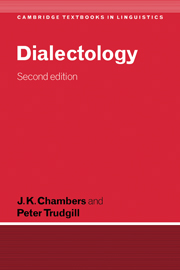Book contents
- Frontmatter
- Contents
- Maps
- Figures
- Tables
- Preface to the second edition
- The international phonetic alphabet
- BACKGROUND
- SOCIAL VARIATION
- SPATIAL VARIATION
- MECHANISMS OF VARIATION
- 9 Variability
- 10 Diffusion: sociolinguistic and lexical
- 11 Diffusion: geographical
- 12 Cohesion in dialectology
- References
- Index
12 - Cohesion in dialectology
Published online by Cambridge University Press: 05 June 2012
- Frontmatter
- Contents
- Maps
- Figures
- Tables
- Preface to the second edition
- The international phonetic alphabet
- BACKGROUND
- SOCIAL VARIATION
- SPATIAL VARIATION
- MECHANISMS OF VARIATION
- 9 Variability
- 10 Diffusion: sociolinguistic and lexical
- 11 Diffusion: geographical
- 12 Cohesion in dialectology
- References
- Index
Summary
For much of its history, practitioners of dialectology viewed it as an autonomous discipline, with its own goals and unique methods. In this guise, it became established as an academic discipline and contributed a fascinating chapter to intellectual history. Its heritage is the classic dialect atlases of the first half of this century, and they continue to nurture and inspire research on dialects to this day – even, arguably, with greater impact now than a few decades ago.
One of our purposes in this book has been to make accessible the methodology and some results of autonomous dialectology or dialect geography to general readers and students. To that end, we devoted much of the book (Chapters 2, 3, 7 and 8 as well as parts of many other chapters) to traditional dialectology.
It forms one of the main streams of the modern discipline of dialectology. A second stream, and an enormously influential one, is the study of urban dialects, which is usually referred to under the general heading of ‘sociolinguistics’. The methodology and results of urban dialectology and the crucial perspective it offers on linguistic innovation (as discussed especially in Chapters 4, 5 and 6; 10.1 and 10.2) belong to the foundations of modern dialectology as we see it.
Another of our purposes has been to demonstrate that the confluence of these two streams forms a coherent modern discipline.
- Type
- Chapter
- Information
- Dialectology , pp. 187 - 189Publisher: Cambridge University PressPrint publication year: 1998



